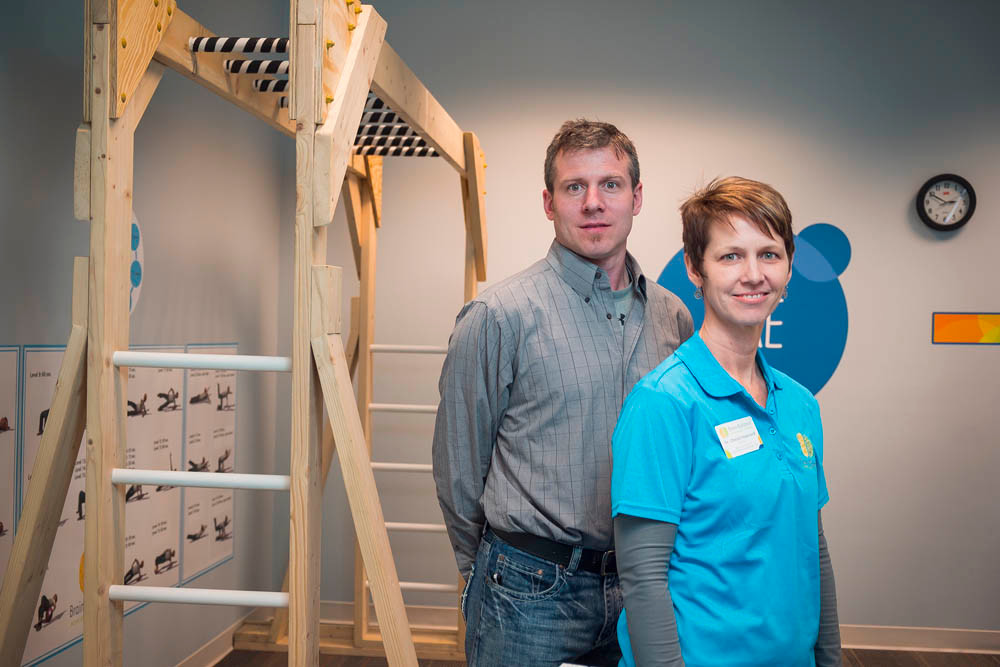YOUR BUSINESS AUTHORITY
Springfield, MO
YOUR BUSINESS AUTHORITY
Springfield, MO

Christi Hancock is in the business of tearing labels off of youth with developmental disabilities.
She does so by going straight for the brain.
“The brain is the main controller of the body,” says Hancock, the franchise owner of Brain Balance of Springfield.
Over 100 Brain Balance centers across the country treat behavioral, learning and social disorders in children through a multifaceted approach with sensory motor, academic and cognitive exercises. The concept doesn’t leave much room for labels – or the conventional treatments that follow.
“A label is a label. It’s just giving us an idea of what’s going on,” Hancock says.
Once identified – say, as attention deficit hyperactivity disorder or Asperger’s syndrome – the Brain Balance team digs into the underlying issues.
“That’s what we’re looking at: Why? Why are these kids being labeled that? The why is what we’re dealing with and addressing,” Hancock says.
In the United States, one in every 68 people is born with an autism spectrum disorder, according to the Centers for Disease Control and Prevention in 2014. Go back to 2000, and it was one in every 150. Brain Balance founder Robert Melillo says the prevalence of autism 30 years ago was reportedly one in 10,000.
“This is a legitimate epidemic,” he says.
Melillo didn’t set out to become a franchisor, but he says the research led him there.
A New York clinician with degrees in chiropractic, neuropsychology and neuroscience, Melillo’s efforts are the product of the 1990s, dubbed by Congress as the “decade of the brain.”
“There was more brain research in the ’90s than throughout all of recorded history,” Melillo says of the proclamation signed by former President George W. Bush in July 1990 to kick-start the research and a joint initiative by the Library of Congress and the National Institutes of Mental Health.
For his part, Melillo was discovering new ideas about the brain hemispheres.
“There were these imbalances at the core of many developmental issues,” he says.
For instance, he says those labeled with ADHD have struggles from the right side of the brain and strengths from the left side of the brain.
“These people are actually very bright. But they really struggled in other things,” Melillo says.
He also found dyslexia was the exact opposite of ADHD in the brain.
“That was the ‘aha’ moment,” he says.
He first wrote a textbook, “Neurobehavioral Disorders in Childhood, an Evolutionary Perspective,” to define the scientific model. Then, he brought it to laymen’s terms in his published book, “Disconnected Kids” and the Brain Balance business model.
Up and running in 2006, he began franchising Brain Balance two years later.
Today, he’s sold rights to 150 centers, with 20-30 scheduled to open this year.
One of the centers operates in conjunction with Shelterwood residential treatment school in Independence, Missouri. Melillo says it’s the first school nationally to incorporate his training program.
Shelterwood brought the program in-house in 2014, and officials say about half of the teens at the boarding school are enrolled.
“It is an elected, additional option for families,” says Amanda Gunter, the executive director for Brain Balance at Shelterwood.
About 150 students have been through the program now, she says, and studies are underway to gauge the long-term impact upon completion.
“What we know is we really need appropriate cognitive skills to make progress in treatment. Their brains are stuck in “fight, flight or freeze,” or survival mode because of experiencing trauma,” Gunter says. “We can activate the brain, improve the function of the brain, and it makes our counseling and our education program more successful.”
Gunter says there is no fee to the school, just a commitment to the Brain Balance team.
“It has reduced, at times, the length of stay at the boarding school, which definitely is a financial savings for the parents,” she says.
Hancock operates two Brain Balance centers, one in Springfield and another in Columbia.
A chiropractor by trade near Lake of the Ozarks, Hancock and her husband Christopher bought into the Brain Balance franchise in November. In the deal, the Hancocks also acquired the center in Columbia from Todd and Carolyn Pridemore. The Pridemores introduced the concept to Springfield about a year ago.
Hancock says the program targets school-age children in K-12, beginning with a three-hour assessment to help pinpoint a cause of, say, their dyslexia or attention deficit disorder.
“The assessment lets us evaluate where the brain is imbalanced,” she says. “We work with stimulating that weak area and bring that area up to an integrated, balanced brain.”
The program rate is roughly $6,500 for three months of treatment. Stephanie Lay, the Brain Balance center director in Springfield, says customers pay out of pocket.
“Since we don’t diagnose, and don’t require a diagnosis, insurance doesn’t pay for it,” Lay says, noting discounts and scholarships are discussed in the child assessment results.
With currently about a 15 students enrolled in the program, she says behavior is the biggest driver to the center.
The average length of programming is six months in the center – typically 60-minute sessions three days a week – followed by a year of follow-up.
Between the two centers, Hancock splits time while running her 14-year-old clinic, Absolute Wellness Center in Linn Creek.
“I’m very busy,” she says, noting she visits each center once a week, for staff meetings.
“I’m not one who bought the business to let them run it,” Hancock says. “I have my hands in it, and I want to feel the benefit of what we’re doing with the kids, too.”
Connected to Watkins Elementary School is a new storm shelter now under construction.
STL construction firm buys KC company
Updated: Systematic Savings Bank to be acquired in $14M deal
Webster University's deficit triples
Missouri House speaker accused of obstruction in ethics probe
‘Dress for your day’: Companies are relaxing dress codes amid evolving ideas about fashion
Developer targets opening by month's end for $10M apartment complex